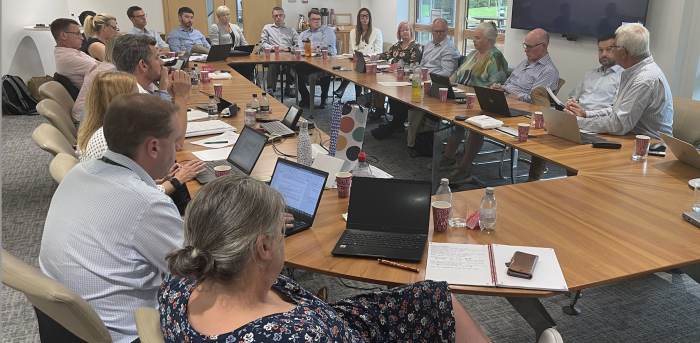There is little sign yet of significant pig industry herd recovery or substantial investment, despite the significantly improved financial situation and more positive outlook among producers, according the NPA’s Pig Industry Group.
“Everyone is a lot more positive now about where pig prices and feed costs have gone,” the East producer representative said, sentiments backed up by other producers across
“There is a lot more optimism in terms of margins, but no-one is rushing to invest, with the cost of construction and interest rates where they are,” the Northern representative added.
The Midlands representative expressed sadness at the continuing loss of independent producers, particularly in the wake of the recent acquisition by Cranswick of the Elsham Linc business.
“There should be really good optimism with prices at the moment, but I think a lot of people may be still just thinking about their future security and what form the independent sector is going to take going forwards,” he said.
Hugh Crabtree, the NPA’s vice-chair, said the buildings and equipment sector had always predicted there would be a time-lag between producers returning to profitability and renewed investment activity, as gaping financial holes are filled, based on previous downturns. This was very much proving to be the case, with many pig supply businesses are still ‘treading water’, although the construction companies are seeing some activity in projects were delayed due to the crisis, he said.
The veterinary representative said numbers internally on some farms are growing again back towards more normal levels where there had been significant contraction, although people still aren’t expanding herds.
“There’s a bit less space between farrowings than there was. Although everyone is a bit more optimistic when you start talking about prices, we are seeing a bit of a mental health backlash on farm,” she said.
“People kept going when it was bad and, now they’ve given themselves time to breathe, I’m seeing a few that are struggling mentally at the moment, and they certainly aren’t even considering investment. They need a lot more support.”
Straw concerns and feed costs
Regional representatives described the harvest as variable, with concerns expressed about straw quality and a potential mycotoxin risk due to the amount of rain during the season.
“The biggest challenge during harvest has been getting the straw in,” the Eastern representative said. “A lot of people had to bale questionable straw, and it has been difficult to get it dry, with straw laid down for three or four weeks before baling.
“We are probably going to see an increase in mycotoxins in the straw this year, so we will be increasing mycotoxin binders in our feed rations in preparation.”
The feed industry representative highlighted improving feed prices, with wheat trading at around £185/tonne and barley around £10 lower. “We are still keeping an eye on Ukraine, but they seem to be getting grain out pretty well, even though the corridors not back up and running,” she said.
“In terms of harvest, there have been variable yields and quality. The talk is that protein levels are down, which is not great for bread wheat, but if that means more feed wheat gets downgraded as a result, it’s probably favourable from the feed perspective.”
Soya is trading about £440/t, with China driving demand, and prices over the £400-mark looking like they’re ‘here to stay’.
Health issues and ASF concerns
Producers generally reported fairly stable pig health across the regions, albeit with some concern over increasing swine dysentery cases, a point reinforced by the veterinary representative.
She highlighted the communication campaign to encourage all pig keepers who import pigs, but more so those running small non-commercial herds, to ensure they follow the NPA protocol and test pigs for PRRS2 to keep new strains circulating in Europe out of the country.
There was also concern expressed generally about recent new cases of African swine fever in northern Italy and Sweden and the continued delays in implementing proper checks on meat imports from the EU.
The NPA continues to raise this with Government and, in the absence of border checks, is urging it to step up the enforcement of rules brought in a year ago banning non-commercial imports of pork products of over 2kg, NPA chief executive Lizzie Wilson said.
This is against a backdrop of evidence that frozen, raw and uncooked meat products marked clearly as suitable only for sale in the originating country had been detected after being brought into the country. The Government, itself, has admitted in its own Border Target Operating Model document this would not be happening if proper checks were in place.
The NPA also continues to press Government for clarity on its approach to the regionalisation of exports in the event of a UK outbreak. The association is keen for it to commence discussions with trading partners now, as other EU countries have done.




